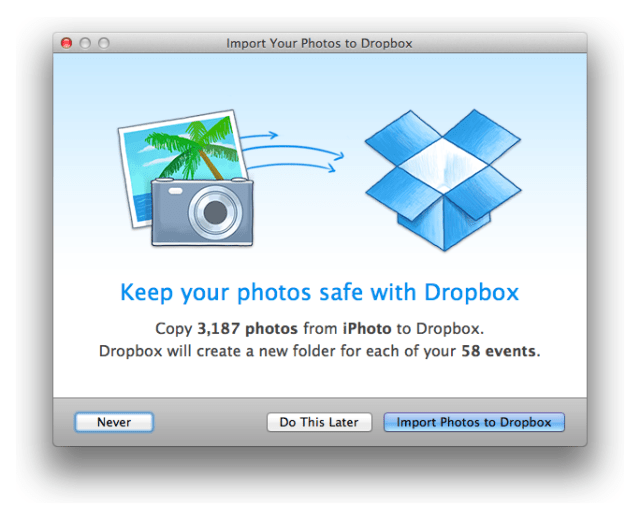If you’ve been watching Dropbox at all over the last couple of years, you’ll be completely unsurprised at a new feature announced today. The apps on Mac have gained the ability to automatically detect, upload and ready shared links to the screenshots you shoot on your computer.
That’s pretty much the main reason apps like Cloud.app even exist, and really throws a wrench into that app’s core feature set. But in reality, this move will be useful to a mere subset of Dropbox users. Automatic screenshot uploading is great for ‘Internet people’. Journalists, heavy Twitter users, app developers, designers and collaborative teams. This is not a tiny subset and I’m certainly very grateful that this feature gives me an alternative to Cloud.app. And I’m sure that sharing snaps of a screen might actually become a more common behavior just because Dropbox has added support for it. If you wanted to be really cynical, you could even say that this was a bit of fan service for journos, who take a lot of screenshots — and will probably write about this feature (hi!).
But the second slice of today’s announcement is the much bigger one in my opinion. It’s an importer that allows you to upload your entire iPhoto library to Dropbox, organized by event, in one go.

Dropbox has previously announced products that automatically upload images shot on the iPhone, on Android devices and uploaded from cameras on your desktop Macs or Windows machines. This is different because it reaches into your photo past and copies over everything you’ve shot even before Dropbox.
This is where you start to think about the roadmap of Dropbox’ commercial products. If the endgame of this current push is to be the default place where people store photos — and I believe that it is — what does that enable? If you can count on every photo you’ve ever shot and every one you will shoot being uploaded automatically from your smartphone, your digital camera and more, then the answer is: a lot.
First of all you have incredibly powerful system lock-in. Yes, they’re your files and you can do whatever you want to them, including download them and place them in some other cloud repository. But the lock-in is more than just ‘data’. It’s ‘memories’ that Dropbox is ‘keeping safe’. Even if you moved to another platform, why would you feel the urge to move away from Dropbox as your primary repository? If you’re set up with auto-upload on all of your platforms, my gut feeling is that ‘once you’re in you’re in’.
All of this chat makes you think hard about what companies like Apple and Google are doing with photos. Apple enables iCloud to snag first dibs on all of you photos shot on iPhones (which many people are using as their primary cameras). Google does the same with Google+ photos. And Dropbox, the third party, is attempting to undercut both of them with automated tools and at least the appearance of impartiality. Going with Dropbox means that you can swap between iOS and Android at will and still have full cloud access to your photos. Google allows you access to them via its G+ app on iOS, but that’s a relative one-way ticket.
And it also makes one think back to that reported meeting between Steve Jobs and Dropbox partners Arash Ferdowsi and Drew Houston. Jobs told Houston that he had a feature, not a product, on his hands, and that he was about to go after their ‘cloud storage’ market. Back then I’m not sure that Dropbox had it in mind to focus on photos in the consumer space — that came after a lot of user behavior examination.
But in the end, it might actually be better that Dropbox exists as a standalone feature, rather than as an interchangeable cog in one of the other major ecosystems. After all, iCloud isn’t exactly reliable and Google has yet to create a relationship with its customers that doesn’t rely on leveraging their data for advertising. A neutral third-party ‘feature’ might actually be the best way to keep your photos safe. Provided it can find a way to stick around, of course.
Image Credit: Frédéric BISSON/ Flickr CC
Courtesy: techcrunch


